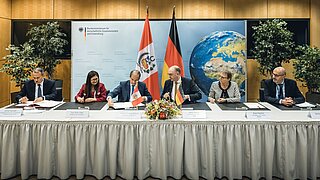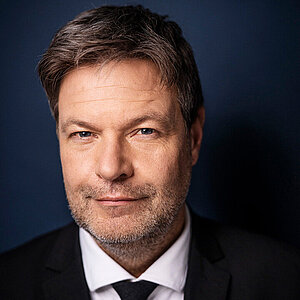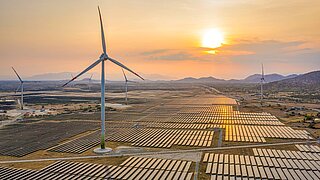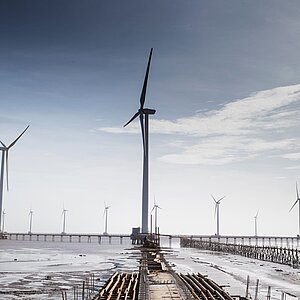Partnerships for global climate action
The climate crisis is a global challenge. If global warming is still to be limited to 1.5° C, we must intensify our climate action efforts worldwide. Germany is actively working towards this goal through various climate partnerships worldwide, with the IKI playing a crucial role.
In 2009, advanced economies from around the world gathered in Copenhagen and agreed to mobilise $100 billion annually for climate change mitigation and adaptation in for the ‘global South’ starting from 2020. This commitment aims to support developing and emerging countries in transitioning their economies to climate-friendly models.
Germany is dedicated to supporting sustainable transformations in ambitious partner countries and actively engages in bilateral and multilateral partnerships worldwide.
Bilateral partnerships with individual countries
Bilateral partnerships consist of direct cooperation between Germany and a specific country. These tailor-made partnerships align with the nationally determined contributions (NDCs) and strategies of partner countries, aiming to promote a comprehensive socio-ecological transformation of their economies and improve living standards. The primary objective of these partnerships is to rise ambition, ultimately working towards achieving the goals outlined in the Paris Agreement.
The International Climate Initiative (IKI) implements projects worldwide making it a cornerstone of Germany’s contribution to international climate action. This applies to countries with existing bilateral climate partnerships and all other IKI partner countries. The IKI maintains particularly strong relationships with its 14 IKI focus countries, in which the IKI uses interface projects to establish very close communication with political partners and improve the networking in the country for the IKI portfolio.
Since 2017, the IKI has collaborated with partner governments in most of the focus countries to organise country-specific bilateral country calls. These calls aim to concentrate efforts on one or two climate or biodiversity topics that are especially important for the respective partner government.

One recent example is the new bilateral climate partnership with Peru, which was agreed upon shortly before the 27th UN Climate Change Conference (COP27) in Egypt. This partnership supports the country with projects that promote climate change mitigation while assisting local people to improve their resilience to the impacts of climate change. Germany is supporting Peru to establish sustainable public transport systems, so as to reduce emissions of the greenhouse gas CO₂. In the Amazonian rainforest, the primary focus is on protecting the forest crime, which is also threatening indigenous communities. In the future, the IKI will provide support for projects stemming from this partnership.
JETPs: plurilateral partnerships for a socially equitable energy transition
Alongside its bilateral climate partnerships, Germany is also working together with other advanced economies as members of plurilateral partnerships known as ‘just energy transition partnerships’ (JETPs). Through the partnership, multiple advanced economies support one partner country and help it accelerate its just energy transition. Worldwide, Germany is participating in a number of similar initiatives worldwide, with part of the German contribution provided through IKI funding.
A key focus here is on major polluters in the global South who have declared their commitment to raise their climate change mitigation ambitions in line with a 1.5 °C target and to accelerate their coal exits. To ensure a just energy transition, various countries join forces to create an international partner group (IPG) for each of these JETPs. This IPG provides financial and technical support to countries within the scope of a JETP. Some examples include the closure of coal power stations, expanding renewable energy and the infrastructure that it requires, and creating a just transition to a lower-emission future.
JETPs target the country’s energy systems as a whole and are therefore much more than the sum of individual partial measures. At the same time, as JETPs are country-focused, ownership by the respective partner country is essential. This means that the governments of recipient countries lead negotiations with donor countries and the partnerships are designed to ensure that they meet the needs of the individual countries and achieve a high level of climate policy ambition.
Three JETPs by the end of 2022
As plurilateral climate partnerships, JETPs constitute a central instrument of German foreign climate policy. By the end of 2022, there was agreed JETPs with Indonesia, South Africa and Vietnam.
The first JETP was concluded by South Africa with the EU Commission, France, Germany, the UK and the USA in 2021, during the 26th UN Climate Change Conference (COP26). JETPs with Indonesia and Vietnam followed in November 2022 and December 2022, respectively, this time with the participation of all G7 countries including Denmark and Norway.
South Africa: Coal exit and renewable energy expansion

The JETP signed with South Africa aims to accelerate its coal exit while expanding renewable energy as part of a just energy transition. Overall, the country aims to cut greenhouse gas emissions by 1 to 1.5 billion tonnes over the next 20 years. By way of comparison, Germany emitted around 762 million tonnes in 2021. These measures are focusing on decarbonising the electricity sector, vehicles with alternative drive systems and green hydrogen.
South Africa will need to make large investments to achieve these aims. For the period 2023 to 2027, the country will need to find an estimated $100 billion. Within the JETP format, the IPG is providing €8.5 billion and therefore roughly 8.5 percent of this first tranche of funding as initial finance.
Initial investments will concentrate on catalytic infrastructure investments in the power sector. These will involve the closure of coal power stations, the modernisation of transmission and distribution networks, and the expansion of PV and wind power for electricity generation. Investments in new sectors of the green economy will also receive funding.
A JETP Secretariat, co-founded by the IPG and South Africa, is coordinating the partnership in the country. In November 2022, an investment plan was published at the 27th UN Climate Change Conference (COP27) in Egypt; this will be followed by an implementation plan before the next COP28 at the end of 2023.

"African countries are important partners in the diversification of our value chains and the decarbonisation of global energy systems. This is hugely important, not least in light of the climate crisis, which is hitting southern Africa particularly hard. At the same time, though, some of the answers are to be found here: solar energy and wind power are important renewable resources and should be utilised."
IKI contribution to the JETP South Africa
The International Climate Initiative (IKI) is also contributing to the JETP South Africa. A key element of the IKI funding provided is the ‘Just Transition to a Decarbonised Economy for South Africa (JUST SA)’ project. At national level, the project supports the stakeholder dialogue managed by the Presidential Climate Commission (PCC) on the topic of a just transition, with the aim of ensuring an inclusive and results-oriented process. At regional level, the project is supporting the provincial government of Mpumalanga in its formulation and implementation of a sustainable and just plan for the transition to a diversified, regional decarbonised economy. At local level, the project is managing the province’s plan in selected communities in Mpumalanga, implementing projects and creating incentives for the private sector.
Three other IKI projects are also contributing to a just transition in South Africa.
Current IKI projects as part of the JETP South Africa
Indonesia: net zero emissions in the power sector by 2050

Targets set for the JETP with Indonesia envisage reaching net zero emissions in the electricity sector by 2050. An emissions peak in the electricity sector and a share of at least 34 per cent of renewable energies in electricity production by 2030 have been agreed. In addition, no new grid-connected coal power stations are to be constructed other than those already planned (moratorium).
To achieve this, the JETP is mobilising around €20 billion, with financing equally shared between the public and private sector.
To attain these agreed goals, the Indonesian JETP is focusing on reducing fossil fuels and expanding renewable energy generation, as well as making this energy transition socially just. The JETP Secretariat was set up in the first quarter of 2023 in the Indonesian Ministry of Energy. This secretariat will provide support to the Indonesian government for developing an investment and reformation plan. The envisaged reforms will create the political framework conditions for investments in renewable energies and the gradual reduction of fossil energy sources.
IKI contribution to the JETP Indonesia
A key element of the IKI contribution to the JETP Indonesia is the German start-up financing for the ‘Energy Transition Mechanism Partnership Trust Fund (ETMPTF)’ in 2022. Coordinated by the Asian Development Bank, the Energy Transition Mechanism is a regional, transformative programme that aims to accelerate the shuttering of coal power stations and ensure their replacement with clean power. Germany has contributed a total of €30 million to the ETMPTF, with this funding provided via the IKI.
Current IKI projects as part of the JETP Indonesia
In addition, four other IKI projects are supporting the expansion of renewable energy and the just transition in Indonesia. Various advisory projects also support the implementation of a socially just energy transition in Indonesia. The implementation of another project is also envisaged for 2023 while further projects are being planned.
Viet Nam: fewer coal power stations and more renewable energy

Negotiations for a third JETP were concluded with Viet Nam at the end of 2022. The aim is to support Vietnam in achieving its net zero emission targets by 2050 and, in particular, to accelerate the just decarbonisation of its electricity sector. To achieve this, fewer coal power stations are to be built than planned by 2030 and renewable energy as a proportion of the country’s electricity generation is to be increased to 47 percent. For the power sector, peak emissions of no more than 170 million tonnes are also envisaged by 2030.
The IPG has committed itself to providing roughly $15.5 billion of funding, which is to be mobilised in equal parts from public and private sources.
A JETP Secretariat will be set up soon to provide support for the establishment and implementation of the JETP Vietnam. Development of a JETP Resource Mobilisation Plan (RMP) is scheduled for the end of 2023. Consultations are ongoing about the exact additional measures to be handled by Germany.
Current IKI projects as part of the JETP Vietnam
A total of 6 other IKI projects are supporting the expansion of renewable energy in Vietnam. Two other projects are also planned for 2023.
IKI Annual Report 2022
This article is part of the IKI Annual Report 2022. Learn more about the IKI Year 2022 ...
The link has been copied to the clipboard






![[Translate to English:]](/fileadmin/_processed_/1/7/csm_20220302_China_Braunkohle_iStock-1156726052_Wang_Meng__d08d9b7cab.jpg)

